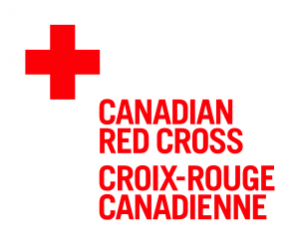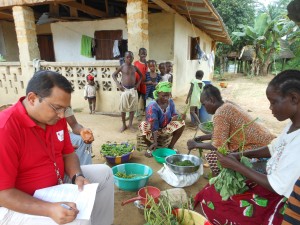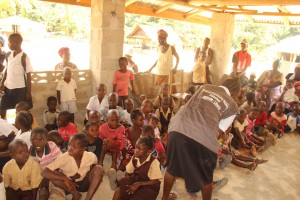Notes from the Field: Bringing Health Services to the Doorstep

Mahawwa, the mother of a one and half year old, noticed that her son who was seriously ill had been passing watery stools for more than four times a day. She decided to take him to the person she believed to be the “medical expert” of the community. The latter prescribed some antibiotics to Chris, the baby, whose condition improved but was not fully healed. Chris often cried and started losing his appetite. He only drank water and gradually stopped eating solid food. The nearest Health facility is within 7 hours walking distance from Mahawwa’s home and there was no one to accompany her. “I was afraid and helpless, and took him door-to-door and cried for help” said Mahawwa. One of her neighbours suggested that she visit the local Community Health Worker known as general Community Health Volunteers (gCHVs) in Liberia. The gCHV did an assessment and found out that Chris was suffering from diarrhoea and gave his mother Oral Rehydration Salts (3 packs) and Zinc (10 tablets). The next day, Chris started playing and eating solid food again. After three days, the gCHVs conducted a follow-up visit and found that Chris’ health status had returned to normal.
The MNCH project implemented by the Canadian Red Cross (CRC) in partnership with the Liberian National Red Cross Society and Ministry of Health was a life saver for baby Chris because it brought health services to the community. The training provided to gCHVs through the CRC project was aimed at improving the knowledge and skills required to carry out assessments (look, feel and check), classify danger signs and make quick referrals, provide counselling and follow ups, record and report. This project not only trained gCHVs but also provided all the required medicines for the treatment of diarrhoea, pneumonia and malaria; some of the major causes of death in under-five children. Since the healing of her son, Mahawwa attended some of the community health sessions organized by Red Cross Volunteers where she learned more on personal hygiene, water and sanitation, maternal health and preventive methods on diarrhoea, pneumonia and malaria. “I am thankful to the Red Cross for your services on health promotion, and also that you brought primary health services in the community. Thank you for your amazing contribution” Mahawwa said.
The CRC is one of the stakeholders that contribute to the Ministry of Health and Social Welfare Community Health Strategy that aims to decrease the under-five mortality rate in Liberia. To date, the CRC MNCH project has trained 104 (women 36, men 68) gCHVs in Integrated Community Case Management (iCCM) that includes diarrhoea, pneumonia and malaria. However, more still needs to be done. People like Mahawwa still get inappropriate health advice from unskilled workers and many communities in Liberia still don’t have access to essential health care that can be provided by a gCHV. 2,500 more gCHVs are needed to cover the entire country.

Canadian Red Cross Project Manager meeting with Community Health Volunteers and Trained Traditional midwife
Author: Tahina Rabezanahary, Program Manager, Africa, Canadian Red Cross
Check out Canadian Red Cross’ CHW activities across sub-Saharan Africa on the 1mCHW Campaign Operations Room.


1 Comment
Claude Eric Rasolondranaly
Bravo!